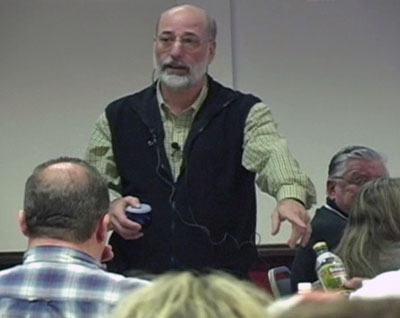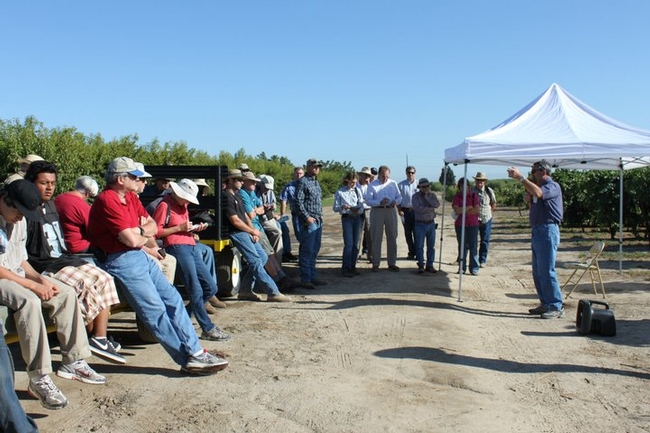
Posts Tagged: Olives
Florida citrus growers explore olive opportunities

Reporter Ryan Raiche covered a meeting at the University of Florida Citrus Research and Extension Center where UC Cooperative Extension farm advisor Paul Vossen introduced growers to olive production and marketing and offered citrus growers the opportunity to taste a variety of olives and olive oils.
“This is not a slam dunk, because this is a really peculiar crop that needs really specific things in order to flower and fruit,” Vossen said.
Olives thrive in a dry climate where it’s not too hot and not too cold. Vossen said rain during bloom season could wipe out the crop.
Ojai man appointed to Regional Water Quality Control Board
Ventura County Star
Gov. Jerry Brown has appointed Ventura County UC Cooperative Extension director emeritus Larry Yee to the Los Angeles Regional Water Quality Control Board.
The board oversees water quality issues and has the power to fine polluters.
Yee worked for the UC Cooperative Extension from 1975 to 2008 and was the Ventura County director from 1986 to 2008. He also was director of the UC Hansen Trust, which was set up to promote agricultural research and education.
Olive growers don't appreciate U.S. support of Morrocon farmers
To ease poverty and stimulate economic growth, the U.S. government has pledged $301 million to help Morrocon farmers rehabilitate existing olive trees and expand olive, almond and fig production. However, San Joaquin farmers say the move undercuts the struggling local industry, according to an article in the Porterville Recorder.
“It’s ludicrous,” said farmer Rod Burkett. “We’re a small industry. We have less than 24,000 acres (of olive trees) in the state. [Morocco] has more than 1 million acres. That gives them a real advantage. Now [the U.S. government] is taking my tax money and giving it to those people so they can make their trees more productive.”
Recorder staff writer Alex Schultz used UC Cooperative Extension figures to illustrate the hardships California olive growers are facing this year. Production is so low - down 86 percent from last year - that harvesting any fruit may not be worth it. Meanwhile, it costs $1,400 each season to maintain an acre of olive trees.

olives
Kearney trial could reveal the next great white wine

Proposed Green Tech High School Academy draws critics
Jennifer Bonnett, Lodi News Sentinel
Lodi Unified School District has proposed developing a Green Tech High School Academy, the first of its kind in California. The district has already spent hundreds of hours and thousands of dollars laying the groundwork for a new school that some trustees say they can’t support. Parent Paul Verdegaal called it the wrong idea at the wrong time. “It appears that LUSD is once again chasing pipe dreams at great cost in money and opportunities for students to actually learn, especially with reduced budgets," he said. The article noted that Verdegaal is a farm adviser for the University of California Cooperative Extension in San Joaquin County. Verdegaal said he sees students who don’t understand science or math, key subjects in creating sustainable practices.
This year's olive harvest is the pits
Martin Espinoza, The Press Democrat
Sonoma County olive growers are bracing for a disastrous harvest, one that could wipe out the supply of fresh local olive oil. Paul Vossen, a farm advisor with the University of California Cooperative Extension, said that in an average low-yield year olive orchards produce 50 to 60 percent less. “We have some places where they have almost nothing,” he said.
Young Family Ranch is a UCCE teaching ground
Thanks to the generous spirit of late brothers Allen and Robert Young, the 3-acre Young Family Ranch in Weaverville is the setting for community workshops on soils, gardening, food preservation and more, reported Laura Christman in the Redding Record Searchlight. The farmhouse basement has been turned into a community classroom. Carol Fall, program specialist with Trinity County UC Cooperative Extension, has office space in the basement. Upstairs, two bedrooms are offices for the extension's nutrition staff. Being at the ranch allows the UC experts to tap into the gardens and orchard for workshops and classes. "We really use this as a teaching facility," Fall said.
Other news:
Modesto olive oil producer celebrates its 75th anniversary
John Holland, Modesto Bee
Nick Sciabica & Sons, in business for 75 years, is the state's oldest, and one of its leading, olive oil producers. Dan Flynn, executive director of the Olive Center at the University of California at Davis, told the Modesto Bee that California companies produced about 1.2 million gallons from the last crop but could soon reach 5 million. The Modesto company is a key part of this. "A lot of people have a high regard for the Sciabica family and all they have done in the industry," Flynn said.
Weather takes olive crop 'from bad to worse'
Tim Heardon, Capitol Press
California olive growers were expecting a lighter crop this season after last year's record yields, but not this light. This year's olive crop estimate is 65,000 tons -- a 67 percent drop from last year's record 195,000 tons, according to a probability survey from the National Agricultural Statistics Service. Adverse weather during the bloom affected the crop as orchards were already stressed from last year's heavy load. In Northern California, an early-winter frost affected many orchards, said UC Cooperative Extension farm advisor Rick Buchner.

A scene at the Young Family Ranch.
USDA's new olive oil standards take effect Monday
The USDA's new voluntary guidelines defining "extra virgin" olive oil go into effect Monday, but many of California's producers are already following even stricter regulations set down by the California Olive Oil Council, according to an article in the Ventura County Star.
USDA's guidelines allow for no defects and no more than 0.8 percent free oelic acid in olive oil labeled "extra virgin;" COOC requires no defects and no more than 0.5 percent free oleic acid.
The new guidelines come on the heels of a UC Davis Olive Center study finding that of 52 bottles of 19 brands of extra virgin olive oils sampled, 32 failed to make the extra virgin cut as described in the new guidelines. The study focused on imported brands, but included two samples each of five California brands. Of the 10 California samples, one failed the extra virgin test.
Even though they are voluntary and there is uncertainty over how or even whether they will be enforced, executive director of the UC Davis Olive Center Dan Flynn welcomes the new national guidelines.
“This is an important first step, because the current guidelines date back to 1948 and are irrelevant to the way olive oil is marketed today," Flynn was quoted in the story. "Instead of ‘virgin’ and ‘extra virgin,’ they use terms like ‘Grade A Fancy,’ as though you were talking about cans of fruit cocktail. It’s a consumer-protection issue."

Olive oil.